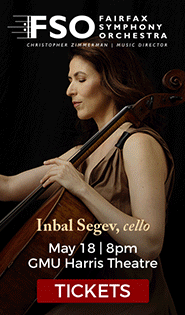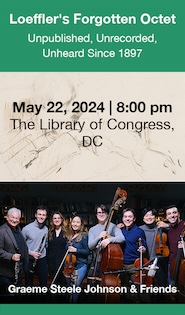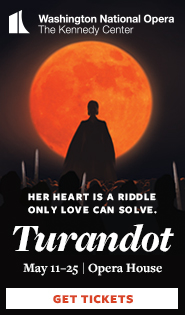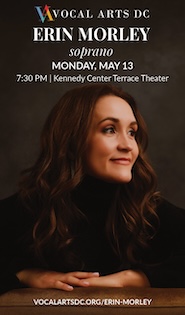Performances
Honeck brings fervent Bruckner and limpid Beethoven to latest NSO stand
Ever since Manfred Honeck last conducted the National Symphony Orchestra, in […]
Rattle returns to Washington with Bavarian RSO in richly varied program
The Bavarian Radio Symphony Orchestra has entered a new era this […]
Hamelin shares ghostly tales and technical wizardry at Library of Congress
Every few years, for a couple of decades now, Marc-André Hamelin […]
Andsnes and Dover Quartet close Fortas season in dramatic fashion
The Dover Quartet has had an unsettled couple of years, since […]
Mezzo’s Wagner songs provides highlight of Apollo Orchestra concert
The Apollo Orchestra continues its season split between two conductors. David […]
Articles
Top Ten Performances of 2023
1. Leif Ove Andsnes. Washington Performing Arts. Leif Ove Andsnes returned […]
At start of seventh season, Noseda is happy and ready for new challenges with NSO
Gianandrea Noseda has begun his seventh season as music director of […]
Opera review
Opera Lafayette unearths another charming find in Mouret opéra-ballet
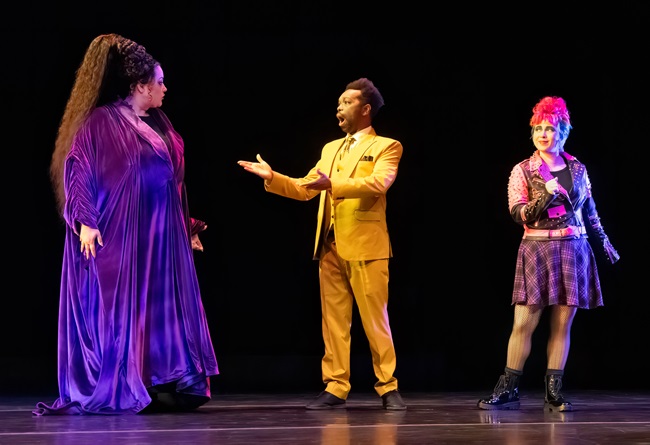
Angel Azzarra (Tragedy), Jonathan Woody (Apollo), and Paulina Francisco (Comedy) in Mouret’s Les Fêtes de Thalie for Opera Lafayette. Photo: Jennifer Packard Photography
The opéra-ballet is a quintessentially French genre, most popular in the 18th century. Equal parts dance and sung drama, it leaned toward comedy more than its main rival, the tragédie lyrique. One such work, Jean-Joseph Mouret’s Les Fêtes de Thalie, enjoyed a few decades of performances after its 1714 premiere and then disappeared, until Opera Lafayette revived it Friday night, in a charming staging at the Kennedy Center Terrace Theater.
Joseph de La Font’s libretto appealed to the craze for polemical arguments about music in Paris. In a prologue set on the stage of the Théâtre de l’Opéra, the muses Melpomene and Thalia bicker over who Apollo favors more, tragedy or comedy. The god of music calls for a competition, after which three short entrées present mostly comic scenes on unrelated stories. The work was so popular that Mouret added other entrées over the years.
Angel Azzarra made an imposing Melpomene, her robust dramatic soprano suiting her costuming as an opera diva (costumes designed by Marie Anne Chiment). Listing off the works that gave tragedy the upper hand, all by Jean-Baptiste Lully, she hammed up the role appropriately with a powerful sound and much indignation. Spots of light circled on the stage as the chorus, made up of the entire cast, answered her claims, singing from the orchestra pit where they required no extra costumes.
Poking fun at tragedy was the Thalia of soprano Paulina Francisco, who stepped in only about two weeks ago to replace the indisposed Margot Rood. Francisco’s lighter soprano and kicky stage presence combined aptly with her costuming, making her look something like a rainbow-haired Cyndi Lauper. Her runs sparkled beautifully in the fast-moving air “Venez, volez de toutes parts.” Preparing for the competition, she invited dancers and other performers onto the stage to prepare for the scenes to come.
In the first entrée, “La Fille,” Jonathan Woody lent his solid bass-baritone to the role of Cléon, a man who returns to his wife and daughter after a long absence. Francisco showed a more plangent side of her voice as the daughter, Léonore, who resists the offer or marriage from Acaste, the sea captain who rescued her father. A ridiculous plot involves Acaste, sung by the somewhat underpowered baritone Jean-Bernard Cerin, trying to make Léonore jealous by wooing her mother, played with hilarious exaggeration by tenor Patrick Kilbride en travesti.
Soprano Pascale Beaudin had a lovely turn in the second entrée, “La Veuve Coquette,” as Isabel, a woman who is enjoying the freedom of widowhood. Azzarra returned here as her pushy friend, Doris, who helps her negotiate the dueling advances of two suitors, a military man named Léandre, sung by the forthright tenor Scott Brunscheen, and a wealthy financier named Chrisogon, the equally pleasing bass-baritone John Taylor Ward.
Beaudin turned more caustic as the scorned wife Caliste in the third entrée, “La Femme,” in which she catches her husband philandering when he tries to seduce her, but in costume at a masked ball. Soprano Ariana Wehr made an energetic confidante for Beaudin, her bright vibrato fueling her high notes and active runs. Cerin had a more confident turn here in the role of Caliste’s husband, without extremes of range to challenge him.
The original prologue, mocking the tragédie lyrique, caused enough of a stir that Mouret revised the end of Les Fêtes de Thalie with an entrée mocking the critics of the work. Why should the muses fight, after all, when human critics already do the attacking? Kilbride had another comic turn here as Momus, the spectacled god of satire and mockery. “Of the poetry I will say nothing but that I am very glad that I am not the author of it,” he quipped, a line to be filed away for future use.
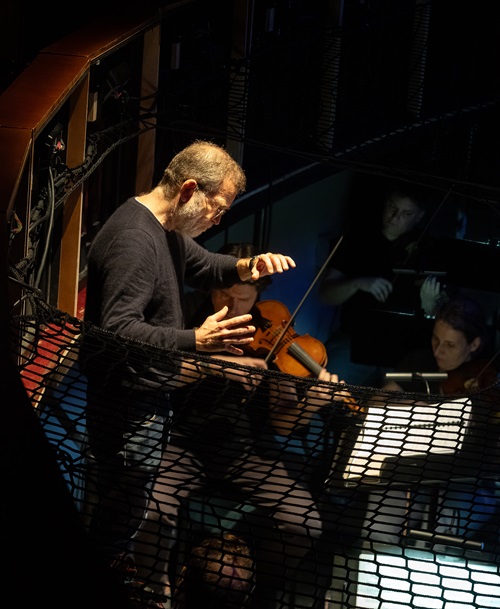
Christophe Rousset conducted Opera Lafayette’s production of Les Fêtes de Thalie. Photo: Jennifer Packard Photography
Christophe Rousset, who already lent his skills as a harpsichordist last fall, returned to make his Opera Lafayette conducting debut with this production. He brought out many charming aspects of this score, which really does deserve to be heard more, with an assured hand, aligning singers deftly with the finely honed orchestra of period instruments in the pit.
Young Belgian harpsichordist Korneel Bernolet, who has assisted Rousset with his ensemble Les Talens Lyriques since 2014, provided brilliant realization of the continuo part. (He also supervised the reconstruction of the orchestral parts.) Strong contributions surrounded Bernolet, not least from traverso flutist Immanuel Davis, Margaret Owens on both recorder and oboe, and many touches of vibrant percussion from Michelle Humphreys.
Two dance companies shared the choreography of this charming performance. Four dancers from New York Baroque Dance Company, choreographed variously by Julia Bengtsson, Julian Donahue, and Caroline Copeland, provided the expected sorts of French steps and movements, all gorgeously. Four women from Kalanidhi Dance, choreographed by Anuradha Nehru and Pragnya Thamire, introduced Indian classical dance seamlessly into the mix, loud foot stamps and all, mainly in the “Veuve Coquette” section, which showed an Indian wedding rather than a shepherd union.
Director Catherine Turocy wove all of these elements together in her production, making the most of limited means. Jeffrey Martin’s scenic design suggested backdrops, lit effectively into different moods by Christopher Brusberg. At the conclusion of the appended entrée about criticism, all the singers and dancers reunited for an ensemble dance scene in honor of Terpsichore, the muse of dance. In an art form with so many genres combined, which one really has the upper hand?
Les Fêtes de Thalie will be repeated 7:30 p.m. May 4 at the Kennedy Center, and 6 p.m. May 7 at El Museo del Barrio in New York. operalafayette.org
Calendar
May 8
Mateusz Krzyżowski, pianist
6 p.m. Kennedy Center Millennium Stage
[…]
News
Vocal Arts DC announces a varied 2024-25 season
Vocal Arts DC has announced its lineup for the 2024-25 season […]
Kennedy Center announces a bounteous season for 2024-2025
The National Symphony Orchestra and Washington National Opera, the flagship organizations […]
